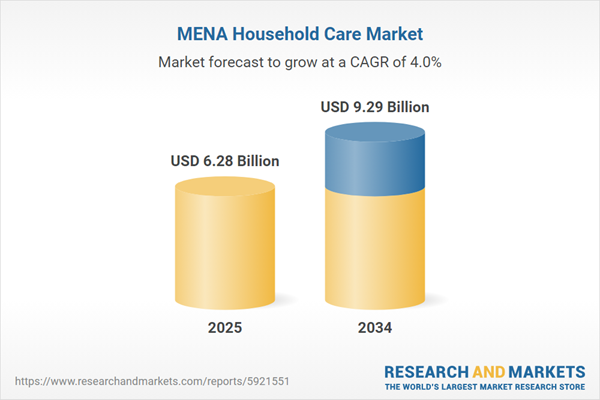Rising Concerns Regarding Hygiene Boosting the Market Growth for Household Care
The introduction of various favourable initiatives and brands to increase awareness regarding hygiene is propelling the growth of the household care industry. This is surging the demand for multi-purpose cleaning products and disinfectants. The increasing launch of value-added products with improved formulation for cleaning by the leading companies is further augmenting the market growth. In addition, the expansion of retail outlets, such as supermarkets and convenience stores in Morocco and Iran, is enhancing the accessibility of household care products. Moreover, the tourism and hospitality industries are growing rapidly in the region. As hygiene is an important aspect of guest satisfaction, the hospitality industry is increasingly using detergents, surface cleaners, and toilet care products to deliver high standards of cleanliness. This is providing further impetus to the growth of the household care industry.The rising hygiene concerns are boosting the growth of the online retail sector. The middle-class population in countries such as the United Arab Emirates and Saudi Arabia are increasingly preferring the e-commerce sector for purchasing household care products. Meanwhile, the penetration of e-commerce companies and the inflating disposable income in North Africa is increasing the awareness and accessibility regarding household care products, hence bolstering the market growth. The growing availability of cost-effective products, such as laundry detergents, is surging their demand among the low-income population, which is also aiding the industry growth. Moreover, consumers are increasingly preferring convenient household care products owing to hectic lifestyles.
Household Care: Market Segmentation
Household care comprises of a range of products that are used to enhance hygiene and cleanliness in enclosed spaces. They are integral in maintaining both public and personal health. They can reduce the presence of viruses and microscopes and prevent various infectious diseases. With their excellent cleaning properties, they can enhance the life of a product.The major products of household care are:
- Laundry Detergents
- Laundry Additives
- Dishwashing
- Hard Surface Cleaners
- Toilet Care
- Others
The market can be broadly categorised on the basis of its distribution channels into:
- B2B
- Institutional
- Hospitality and Hotels
- Healthcare
- Industrial
- B2C
- Standalone
- Supermarkets/Hypermarkets
- Online
The report looks into the regional markets of household care like:
- Saudi Arabia
- United Arab Emirates
- Iran
- Egypt
- Morocco
- others
The market is witnessing a rapid growth owing to the surge of the coronavirus pandemic. This is because of the rising demand for enhanced hygiene and cleanliness in domestic spaces. The emergence of the second and third wave of the pandemic is expected to increase the time spent on homes. This is consequently elevating the use of household care products to exterminate viruses and microbes and aiding the market growth. Moreover, the leading companies in the market are increasingly investing in various research and development (R&D) activities specifically for killing SARS-CoV-2 through detergents and cleaners, which is anticipated to fuel the market growth.
The increasing penetration of household care products owing to the pandemic is evolving consumers preference and is expected to invigorate the industry growth in the long term. In addition, the rising demand for hygienic products for holistic wellbeing by preventing infections is expected to accelerate the market for household care. The reopening of colleges, schools, offices, and other enclosed spaces is increasing the demand for convenient surfactants, which is also facilitating the growth of the household care industry. Moreover, the increasing use of innovative and sustainable packaging materials by the leading companies owing to rapid climate change is also fuelling the market growth.
Key Industry Players in the MENA Household Care Market
The report presents a detailed analysis of the following key players in the MENA household care market, looking into their capacity, market shares, and latest developments like capacity expansions, plant turnarounds, and mergers and acquisitions:- Unilever PLC
- Henkel AG & Co. KGaA
- Reckitt Benckiser Group plc.
- The Procter & Gamble Company
- Saudi Industrial Detergents Co. (SIDCO)
- The National Detergent Company SAOG (NDC)
- Arma
- Others
Table of Contents
Companies Mentioned
The key companies featured in this MENA Household Care market report include:- Unilever PLC
- Henkel AG & Co. KGaA
- Reckitt Benckiser Group plc.
- The Procter & Gamble Company
- Saudi Industrial Detergents Co. (SIDCO)
- The National Detergent Company SAOG (NDC)
- Arma
Table Information
| Report Attribute | Details |
|---|---|
| No. of Pages | 115 |
| Published | August 2025 |
| Forecast Period | 2025 - 2034 |
| Estimated Market Value ( USD | $ 6.28 Billion |
| Forecasted Market Value ( USD | $ 9.29 Billion |
| Compound Annual Growth Rate | 4.0% |
| Regions Covered | Africa, Middle East |
| No. of Companies Mentioned | 8 |









